| Srl | Item |
| 1 |
ID:
161427
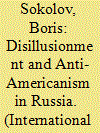

|
|
|
|
|
| Summary/Abstract |
In the early 1990s, the Russian public held overwhelmingly favorable attitudes toward the United States; in recent years, attitudes toward the United States have been overwhelmingly unfavorable. Analysts often trace this dramatic change to (1) the emergence of Russian-American conflicts such as those in former Yugoslavia and (2) Russian leaders’ attempts to escape blame for their country's failures by attributing them to a powerful external enemy. We point to another major factor of Russian anti-Americanism that preceded the international conflicts and the government-led anti-American propaganda: (3) disillusionment, or an emotional and ideological dissatisfaction with the outcome of pro-Western reforms that started among the liberal elites and then spread among the general public. Using data from the New Russian Barometer surveys, we analyze the dynamics of attitudes toward the United States from 1993 to 2009. We find that mass disappointment in the perestroika outcomes preceded the spread of anti-Americanism in Russia and that anti-American sentiment was stronger and occurred earlier among the elite than among the mass public. Furthermore, those (especially better-educated) people who express disappointment with the outcomes of pro-Western reforms prove significantly more anti-American. Our findings illustrate a general ideological phenomenon that may explain the growth of anti-Americanism in unsuccessful democracies worldwide.
|
|
|
|
|
|
|
|
|
|
|
|
|
|
|
|
| 2 |
ID:
090930
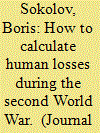

|
|
|
|
|
| Publication |
2009.
|
| Summary/Abstract |
One of the most controversial questions dominating the historiography of the Second World War is that of determining the human cost of this struggle, in particular, the losses suffered by the Soviet Union and its Red Army during this most terrible of 20th century wars. The sheer immensity of these losses, coupled with the radically shifting European borders during and immediately after the war that complicated the task of calculating losses, demonstrates just how formidable, if not utterly futile, this task really is. As a result, estimates of the human losses the Soviet Union's population and military suffered during the war vary widely depending on such factors as the nationality and ethnicity of the author and the methodology the author employed. This article, written by a Russian journalist and historian, presents one of the most radical and gruesome of existing estimates.
|
|
|
|
|
|
|
|
|
|
|
|
|
|
|
|
| 3 |
ID:
159506
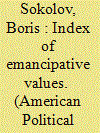

|
|
|
|
|
| Summary/Abstract |
This article reports evidence of misspecification of the measurement model for the index of emancipative values, a value construct used as a key explanatory variable in many important contributions to political science. It shows that the scale on which the index is measured is noninvariant across cultural zones and countries in the World Values Survey. In addition, it demonstrates that the current index composition mixes different value dimensions and their actual associations with various political outcomes, in particular the index of effective democracy. However, an analysis using a novel approximate Bayesian approach shows that at least one specific subdimension of emancipative values, known as pro-choice values, truly exists and may be validly measured and compared cross-nationally. The article also contributes to the recent discussion on whether emancipative values are a reflective or a formative construct by providing thought experiments and empirical evidence supporting the former interpretation.
|
|
|
|
|
|
|
|
|
|
|
|
|
|
|
|
| 4 |
ID:
136134
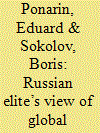

|
|
|
|
|
| Summary/Abstract |
Although the bipolar Cold-War-style mentality is still quite widespread among the rulers of Russian society, it is not a fundamental feature of their global viewpoint. Rather, Russia’s sense of being insulted and disappointed after it failed to join the “premier league” is behind this mindset.
|
|
|
|
|
|
|
|
|
|
|
|
|
|
|
|
| 5 |
ID:
134836
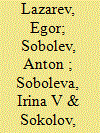

|
|
|
|
|
| Summary/Abstract |
This article aims to explore the microfoundations of political support under a nondemocratic regime by investigating the impact of a natural disaster on attitudes toward the government. The research exploits the enormous wildfires that occurred in rural Russia during the summer of 2010 as a natural experiment. The authors test the effects of fires with a survey of almost eight hundred respondents in seventy randomly selected villages. The study finds that in the burned villages there is higher support for the government at all levels. Most counterintuitively, the rise of support for authorities cannot be fully explained by the generous governmental aid. The authors interpret the results by the demonstration effect of the government's performance.
|
|
|
|
|
|
|
|
|
|
|
|
|
|
|
|